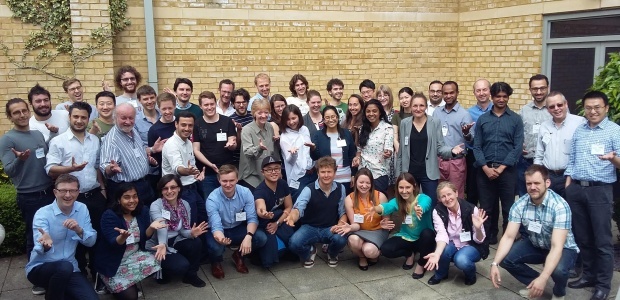
By definition, to innovate means to create something new. To charter undiscovered territories. That’s what we do as researchers, but we do it in an academic context. As a final-year doctoral researcher, I was interested to explore how the skills and knowledge I’ve acquired over the course of my PhD could be channeled beyond the academy, in a commercial environment. Am I ready to handle the rigors and uncertainty of a starting a business? What are the key traits of a successful innovator, and do I have them?
I therefore jumped at the chance to take part in SETsquared’s most recent Researcher to Innovator (R2I) programme, an enterprise and innovation course for early career researchers.

R2I notes cloud
My field is linguistics; I explore how accent and identity interact. In more detail that means I look at how the communities we participate in and the experiences we have shape our language, and how we use language to construct our identity.
So far, I’ve worked in academia and, through an internship in Parliament last year, experienced working in a policy environment. But R2I is a chance for me to gain the transferable skills needed in business. I feel like I already have the soft skills, such as networking and communication, but I’ve not had any experience of knowing if an idea is viable, raising money, protecting ideas and gaining customers and a profit.
The programme really delivered, covering all of this and more. We learned about the ‘business model canvas’, a way of thinking through a potential business idea by considering the value proposition, the customer segment, the cost structure and other important aspects. The concept of ‘pivoting’ was also new to a lot of us, but obvisously so important: it’s about adapting a business idea when it clearly isn’t working.
Networking was top of the agenda for the 3-day course. Doing this early on gave participants the freedom to approach each other easily and openly. It was great to be around such an engaged and fun bunch of people, who were all interested in each others research.
I did wonder how relevant the programme was going to be to me, given my humanities background, but I realised through talking to peers that it is entirely relevant. In a conversation with a fellow researcher I learnt that his scientific research could transform a sporting practice, except he’s having difficulty getting practitioners to listen to him. I asked if he’d considered how that sporting practice is a community, and how participation in that community is tied to identity, so participants might see his research as threatening that. I said perhaps he should take this into account moving forward. He thought that sounded good. In that conversation we both saw our research in a new light. I realised then that when it comes to innovation the humanities are relevant; if science and technology make the world work, then the arts and humanities give us the lenses through which to understand and experience it. Science and the humanities? You could say they go together like ramma lamma lamma ka dinga da dinga dong…
Through real life case studies from R2I graduates, it really came home to me that in starting a business you need to be prepared to fail but have the tenacity and determination to pick yourself up and keep going. You’ve just got to go for it.
For me, one of the most timely elements of the course was a session on effectuation and how you get a business off of the ground. The idea is that you look at your network, the people you know and the skills you’ve got, and you work out what you can do with them. In the next few weeks, I’m going to get out the paper and pens and do this.
I wouldn’t hesitate in recommending R2I to other researchers. Whether or not you have a business idea that you want to take forward, it’s a fantastic environment to make new contacts from a huge range of different backgrounds; through surrounding yourself with people outside your bubble and not like you, you realise what you’ve got and what you can bring. On the course you’ll also gain commercial acumen and business insight. All of this will stand you in great stead in academia or business.

R2I team





![]()